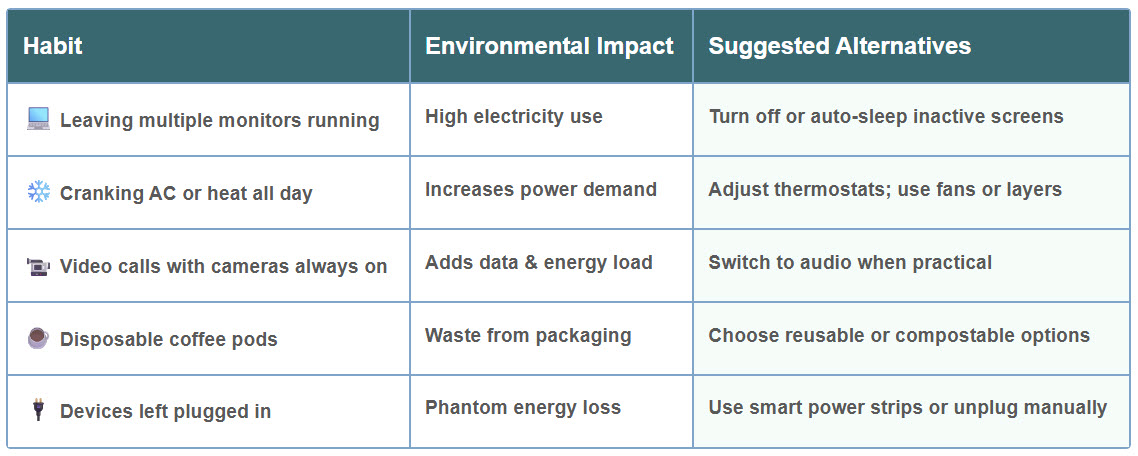How Remote Work Can Transform Your Environmental Footprint

Working from home isn’t just a modern convenience — it’s reshaping the environmental habits of millions. Every skipped commute, unplugged monitor, or homemade lunch adds up to a measurable shift in how we use energy and interact with the planet.
What started as a workplace revolution has become a lifestyle that’s redefining sustainability at the individual level.
Key Takeaways
➡️ Remote work significantly reduces commuting emissions, but it also increases household energy demands. With conscious habits — from smarter heating choices to greener tech setups — home-based professionals can shrink their carbon footprint while improving their comfort, productivity, and long-term well-being.
The Environmental Equation of Remote Work
Commuting has long been one of the largest contributors to personal carbon emissions. Working remotely eliminates that daily trip, reducing both fuel consumption and air pollution. But sustainability doesn’t end with fewer car miles — it shifts to new arenas: electricity use, heating and cooling, and digital consumption.
Even small adjustments — like setting your computer to energy-saver mode or letting natural light replace lamps — help balance that equation. Over time, these choices ripple outward, reducing strain on local grids and resources.
(See more ideas at EnergyStar.gov and Treehugger.)
Community, Connection, and Sustainable Balance
Sustainability isn’t purely environmental — it’s also social. Working from home can improve our carbon impact, but it sometimes erodes the sense of community that traditional workplaces provide. That’s where spaces like Celebrate Work From Home find their purpose.
It’s a paid membership community built for remote professionals who want connection, empowerment, and a bit of fun. Members can share experiences, learn from peers, and access supportive resources that make the remote lifestyle more rewarding, whether they’re freelancers, entrepreneurs, or part of larger organizations.
When people feel connected and supported, they’re more likely to sustain eco-conscious routines. Emotional balance feeds consistency — and consistent habits, like working from home instead of commuting, have real environmental impact. Social sustainability reinforces environmental sustainability.
Energy Habits and Hidden Costs

🌱 Quick Checklist: Greening Your Home Office
💡 Replace bulbs with LEDs or use natural light
🔌 Unplug unused devices and chargers
🥤 Use refillable drinkware instead of disposable cups
🪴 Add a few indoor plants for better air quality
♻️ Compost or recycle food waste responsibly
🌬️ Turn off heating/cooling during off-hours
🖥️ Donate or recycle old tech responsibly
🌿 Everyday Routines That Reduce Waste
Working remotely can nudge us toward greener daily rhythms:
🍳 Cook at home — it reduces packaging waste and improves diet quality.
🚗 Combine errands into one trip per week to lower fuel use.
💻 Streamline your digital life: delete redundant files and reduce email clutter (data centers use energy too).
🌞 Let daylight guide your working hours. It saves power and supports a healthier body clock.
(For inspiration, browse UpWork's sustainability tips.)
Learn and Work Smarter, Greener
Earning an online degree is an often-overlooked sustainability choice. Digital education removes commuting emissions, reduces campus energy demand, and lets students work from where they already live — no dorms, no long drives.
Online learning also scales personal growth in flexible ways. Consider this option: Whether your path leads to business management, cybersecurity, data analytics, or nursing, studying online merges career advancement with lower environmental cost — an elegant combination of progress and preservation.
Product Spotlight: Smarter Lighting for Greener Living
Sometimes the simplest tech makes the biggest difference. Smart lighting tools like the Philips Hue Smart Bulb adjust brightness automatically, using just enough energy for your working hours. Other innovations — like Casper Glow or Nanoleaf — can turn your workspace into a more energy-efficient, mood-friendly environment without waste.
Conclusion
Remote work has become one of the quiet forces of modern sustainability. It reduces emissions, saves energy, and — when supported by community and mindful choices — creates a more balanced way of living. Working from home can be both an environmental act and a personal evolution. The future of sustainability isn’t just about the planet we live on — it’s about how we choose to live in it.

FAQs
Q1: Does remote work really lower my carbon footprint?
Yes — removing commutes alone can cut personal CO₂ emissions by up to several hundred kilograms per year.
Q2: What if my home energy use goes up?
It can, but with efficiency tweaks (smart thermostats, task lighting, energy-saving modes), the balance still favors a net reduction.
Q3: How can I measure my personal impact?
Use free tools like EPA’s Carbon Footprint Calculator.
Q4: What’s the easiest sustainable upgrade?
Start with LED lighting and unplugging idle devices — small, low-effort actions that add up.
Glossary
- Carbon Footprint: The total greenhouse gas emissions caused by an individual or activity.
- Phantom Load: Energy drawn by electronics in standby mode.
- Eco-Routine: A consistent set of daily actions designed to minimize waste or energy use.
- Social Sustainability: Practices that strengthen human connection and community well-being alongside environmental goals.
- Circular Use: Reusing and recycling resources to keep them in the consumption loop longer.
Special thanks to Guest Author/Blogger:
Eric Kelly of My Dadventures
Reach Eric here: [email protected]
https://mydadventures.com/



